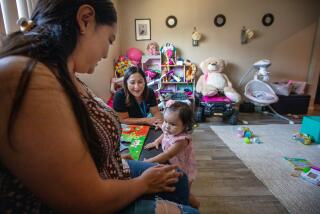MOVING ALONG : In 1992,...
Facing a deepening recession and struggling with their own priorities, families will undergo profound public and private change in the coming year, experts predict.
“In the short term, things could be pretty grim for middle- and lower-income families,” said James P. Steyer, founder of Children Now, a 3-year-old statewide child advocacy organization. “We will see more homeless children, increasing cuts in health and social services for kids, less pencils in schools and greater stress on families.”
Nevertheless, due to widespread perceptions of family decline, experts see a shift in personal values and priorities that in two to three years will help mold public policy in favor of families.
Among their predictions:
- Working parents will demand more time at home.
- Parents in therapy will be urged to avoid divorce.
- Multiple agencies will provide troubled youths with family-type support at school-based centers.
- Political candidates will vie for control of the “family issue.”
Many candidates are framing issues in terms of “our children’s future,” Seyer said. He said his organization will use the 1992 election campaign to compare the candidates’ rhetoric with their later actions. “We are going to demand accountability.”
Orange County political consultant Eileen Padberg said it will be a good year for women candidates because they are perceived as being “more sensitive” to family issues.
In Orange County, child care issues will remain critical, said Catherine Ryan, past president of the Orange County Assn. for the Education of Young Children.
“Many people think that with the recession and folks being out of work, moms will be at home. In Orange County, they can’t be at home,” she said. “Eventually, both parents have to work in Orange County, and some folks will have to go back to school and be retrained.”
The prime latchkey population has become junior high school students, said Sharon Paul, director of human services for the Orange County Department of Education. Children that age are tempted by drugs and gangs at the same time their parents believe that they are old enough to start staying alone.
With so many parents unable to fully support their children, more schools will probably offer full service centers providing integrated counseling, health and tutoring services with other agencies, Paul said. This year, two neighborhood family centers were opened as pilot programs at Dale J. High School and Kraemer Junior High School.
“Our youth are our resources and we can’t afford to ignore their increasing needs,” she said. “This has tremendous promise.”
Meanwhile, movements are under way to make parents more responsible, Seyer said. “We have to send a clear message out to parents in a supportive way that parenting is the most important job you will ever have in your life and you must be responsible about it.”
According to a variety of polls, parents are swinging away from the self-absorption of the ‘70s and ‘80s and toward commitment and community, said David Blankenhorn, president of the Institute for American Values, a New York-based think tank on family issues.
In the workplace, Blankenhorn said parents will be less likely to call for on-site child care than for flexible working hours and family leave options.
The idea of “sequencing,” focusing solely on work or children at different times, will replace the notion of the super mom, he said.
Blankenhorn said more men will become involved in family life, but the greater trend is the absence of men in children’s lives due to divorce, separation and non-marriage.
Blankenhorn further predicted the decline of the word parenting in favor of distinctions between mothers and fathers.
“Elite discourse has insisted on the social irrelevance of sexual differences between men and women,” he said. “Based on the scholarship and the culture around it, it will be more OK to talk about differences between mothers and fathers and to understand those differences and how they play out in the workplace.”
More to Read
Sign up for Essential California
The most important California stories and recommendations in your inbox every morning.
You may occasionally receive promotional content from the Los Angeles Times.










